Related Research Articles

Sir Charles Hubert Hastings Parry, 1st Baronet, was an English composer, teacher and historian of music. Born in Richmond Hill, Bournemouth, Parry's first major works appeared in 1880. As a composer he is best known for the choral song "Jerusalem", his 1902 setting for the coronation anthem "I was glad", the choral and orchestral ode Blest Pair of Sirens, and the hymn tune "Repton", which sets the words "Dear Lord and Father of Mankind". His orchestral works include five symphonies and a set of Symphonic Variations. He also composed the music for Ode to Newfoundland, the Newfoundland and Labrador provincial anthem.

Sir Henry Walford Davies was an English composer, organist, and educator who held the title Master of the King's Music from 1934 until 1941. He served with the Royal Air Force during the First World War, during which he composed the Royal Air Force March Past, and was music adviser to the British Broadcasting Corporation, for whom he gave commended talks on music between 1924 and 1941.
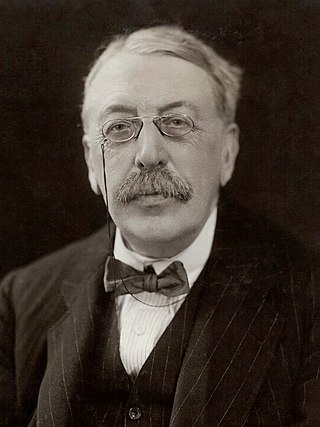
Sir Charles Villiers Stanford was an Anglo-Irish composer, music teacher, and conductor of the late Romantic era. Born to a well-off and highly musical family in Dublin, Stanford was educated at the University of Cambridge before studying music in Leipzig and Berlin. He was instrumental in raising the status of the Cambridge University Musical Society, attracting international stars to perform with it.
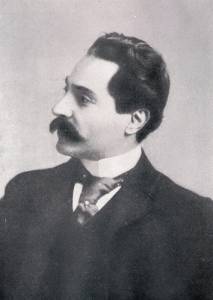
Giuseppe Martucci was an Italian composer, conductor, pianist and teacher. Sometimes called "the Italian Brahms", Martucci was notable among Italian composers of the era in that he dedicated his entire career to absolute music, and wrote no operas. As a composer and teacher he was influential in reviving Italian interest in non-operatic music. Nevertheless, as a conductor, he did help to introduce Wagner's operas to Italy and also gave important early concerts of English music there.

Frederick Corder was an English composer and music teacher.

Much Ado About Nothing is a comedy by William Shakespeare thought to have been written in 1598 and 1599. The play was included in the First Folio, published in 1623.
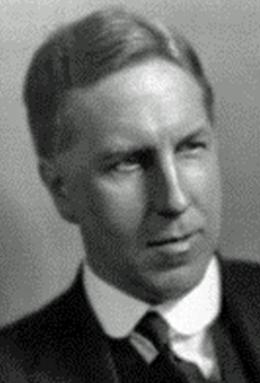
Thomas Frederick Dunhill was a prolific English composer in many genres, though he is best known today for his light music and educational piano works. His compositions include much chamber music, a song cycle, The Wind Among the Reeds, and an operetta, Tantivy Towers, that had a successful London run in 1931. He was also a teacher, examiner and writer on musical subjects.

Julian Russell Sturgis was a British-American novelist, poet, librettist and lyricist.
Charles Villiers Stanford's Serenade in F major, Op. 95 is a composition for a chamber ensemble of nine soloists, composed in 1905.

Three Latin Motets, Op. 38, is a collection of three sacred motets based on Latin texts for mixed unaccompanied choir by Charles Villiers Stanford, comprising Justorum animae, Coelos ascendit hodie and Beati quorum via. The texts come from different sources, and the scoring is for four to eight parts. They were published by Boosey & Co in 1905. The works, some of Stanford's few settings of church music in Latin, have remained in the choral repertoire internationally and are performed in liturgies and concert.
Symphony No. 1 in B-flat major was the first symphony composed by Charles Villiers Stanford an Irish composer, music teacher, and conductor. It was written in 1876 to compete for a prize offered by the proprietors of the Alexandra Palace. It came second out of 46 entries earning a prize of £5. The symphony was dedicated to the tenor Arthur Duke Coleridge who had been a friend of Stanford's at Cambridge. It was first played at The Crystal Palace in London in 1879 but was never published or performed again in Stanford's lifetime.
This is a summary of 1901 in music in the United Kingdom.

The Veiled Prophet is an 1877 romantic opera in three acts by Charles Villiers Stanford to a libretto by William Barclay Squire based on the 1817 poem "The Veiled Prophet of Khorassan" by Thomas Moore. It was first performed in Hanover in 1881, in German. Its sole British performance was given in Italian at the Royal Opera House, London, in 1893, and its first performance in its original English version was at the Wexford Festival in 2019.
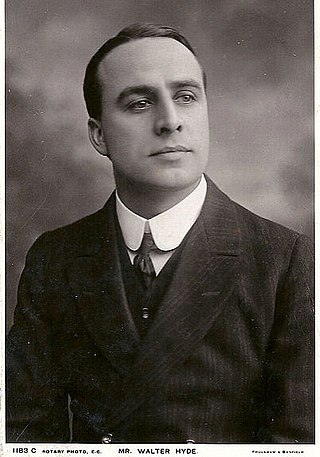
Walter Hyde was a British tenor, actor and teacher of voice whose career spanned genres from musical theatre to grand opera. In 1901 he sang Borrachio in the premiere of Stanford's Much Ado About Nothing and soon appeared in London's West End in light opera and Edwardian musical comedy. He appeared regularly at the Royal Opera House in Covent Garden between 1908 and 1924, becoming known for roles in Wagner operas, among others, both in Britain and America. He was also in demand as a concert artist. In his later years he was Professor of Voice at the Guildhall School of Music where his students included Geraint Evans and Owen Brannigan.

Charles Villiers Stanford's Violin Sonata No. 2 in A major, Op. 70, was composed around 1898. Performed only once during the composer's lifetime, the sonata remained unpublished until 2006.

The Violin Sonata No. 1 in D major, Op. 11, was composed by Charles Villiers Stanford in 1877, shortly after the composer completed his studies in Germany. It was one of his first pieces of chamber music, preceded only by his A major cello sonata. First performed the year it was composed, the sonata was published in 1878 by Ries & Erler in Germany, with a dedication to violinist Ludwig Straus.

The Carnegie Collection of British Music was founded in 1917 by the Carnegie Trust to encourage the publication of large scale British musical works. Composers were asked to submit their manuscripts to an anonymous panel. On the panel at various times were Hugh Allen, Granville Bantock, Arnold Bax, Dan Godfrey, Henry Hadow and Donald Tovey. Up to six works per year were chosen for an award – publication at the expense of the Trust, in conjunction with music publishers Stainer & Bell. Unfortunately the war delayed things for the earliest prizewinners. The first to be published was the Piano Quartet in A minor by Herbert Howells.. By the end of 1920 some 13 works were available. 30 were out by the end of 1922, and when the scheme finally closed in 1928 some 60 substantial works that might not otherwise have seen the light of day had been issued under the Carnegie Collection of British Music imprint.
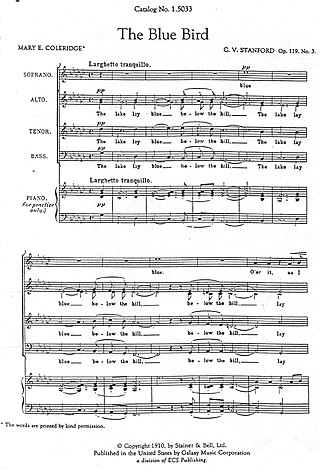
The Blue Bird is a partsong composed by Charles Villiers Stanford in 1910. It is set to the words of L'Oiseau Bleu, a poem by Mary Elizabeth Coleridge, which depicts a bluebird in flight over a lake. It is written for SAATB choir: soprano, divided altos, tenor and bass. "The Blue Bird" is the third of Stanford's Eight Part Songs which are all settings of texts by Coleridge. It was widely performed by choral societies in England during Stanford's life and is considered one of the best English partsongs ever written. It has been recorded by ensembles including The Cambridge Singers, Oxford Camerata, Tenebrae, and the Gabrieli Consort.
The Critic, Op. 144 (1915), is an opera by Charles Villiers Stanford.
References
- Notes
- Sources
- Anon (1) (1901). "Professor Stanford's 'Much Ado about Nothing'". The Musical Times . 47 (701): 472–473. JSTOR 3367678.
{{cite journal}}: CS1 maint: numeric names: authors list (link)(subscription required) - Anon (2) (31 May 1901). "Dr. Stanford's New Opera" (PDF). New York Times. p. 9.
{{cite news}}: CS1 maint: numeric names: authors list (link) - Daly, Karina (2004). Tom Walsh's Opera: A history of the Wexford Festival, 1951-2004. Dublin: Four Courts. ISBN 1-85182-878-8.
- Dibble, Jeremy (2002). Charles Villiers Stanford: Man and Musician. Oxford: Oxford University Press. ISBN 0-19-816383-5.
- Stanford, C. V. (1901). Much Ado about Nothing. London: Boosey and Hawkes.
